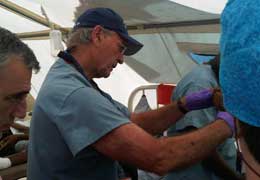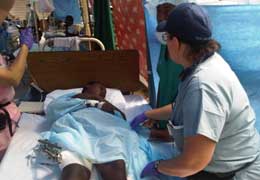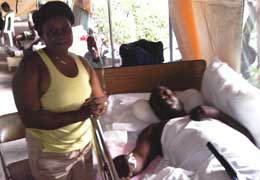Notes on Haiti - CEO Journal Part 15

Note: While serving a medical mission to Haiti, Scripps CEO Chris Van Gorder is writing dispatches about medical aid in progress, conditions on the ground and what can be done to help earthquake victims. For other journal entries, see the Haiti news page.
Today, I would like to share the comments of three more members of the team: Dr. Brent Eastman, Patty Skoglund, RN and Rob Sills. Tomorrow, I will give you some of my final thoughts on this first phase of our Haiti mission.
From Dr. Brent Eastman:
The late U.S. Senator Jacob Javits, R — who died of amyotrophic lateral sclerosis (ALS) — made this statement about health care: “…In healthcare it strikes me that the issues are three: realism, dignity, and love.”
In my career as a trauma surgeon I have seen much devastation, but nothing like what I saw in Haiti. I believe I’m a better surgeon and possibly a better human being for having been there.
Realism
Chris and I arrived on Jan. 23, post quake day 11 (PQD 11) on what was to be a “reconnaissance mission” to find a place where our Scripps Medical Response Team was needed and could operate safely. We found that place at Hospital Saint Francois de Sales, a mile from the epicenter of the earth quake. Chris has described the collapse of that hospital, including a four-story children’s ward that buried as many as 200 small victims. The stench of death will never leave us.
We made surgical rounds at Saint Francois within minutes of our arrival with a Belgian surgeon named Luc, who takes his team from Antwerp to every major earthquake in the world. Luc asked me to see a young man named Jean Kendu, with a crushed right arm and left leg, both extremely swollen and tense with compartment syndrome (high pressure which shuts off blood flow and destroys muscle). Emergency relief by cutting the limb wide open is required. When Luc found out I knew how to do it, he said, “This one’s yours,” and tied a red ribbon on the bed as the pre-op order. We went picking our way over rubble to the “OR” in a partially collapsed building, and “scrubbed” for surgery under a broken faucet in a broken wall dripping into a dirty plastic bucket. Chris was my scrub nurse and he was excellent.
Anesthesia was a single dose of ketamine given by a Belgian anesthesia tech — zero monitoring — who then left. We had extensive bleeding, because it turned out they had given Jean Kendu heparin. Nevertheless, he survived and over the next two weeks we took him back to the OR several times for further debridement of dead muscle. We saved his arm, possibly his leg, but certainly his life — one life in a place where 200,000 others died — and that was what we had come to do. I told the Nuncio that Jean Kendu was my favorite patient, and the Nuncio told him so in Creole. Jean Kendu responded, “I like him too…” which was all I needed to keep me going a few more days.
“Realism” was the fact that we had critically injured patients with devastating injuries and had to operate with the most rudimentary of surgical instruments, anesthesia and supplies. Yet, the reality was that these were human beings who deserved the best we could do with what we had.
Dignity
We quickly learned that, despite the environment of death and destruction, every patient deserved treatment with dignity. And with regard to Haitian doctors and nurses, we also reminded ourselves that we were visitors — there to help — not to occupy and dominate.
Love
I believe we all came to love our Haitian patients, from the orphaned 8-year-old girl to the singing 100-year-old lady, and all in between. Love for patients who had massive injuries themselves while losing some or all of their families, and all of their homes. And I have never been privileged to work with a better team, under more adverse conditions, facing more critical injuries, who achieved such beautiful humane and medical outcomes.
I believe that Jacob Javits would be proud of the Realism, Dignity and Love that Scripps Health has extended to Haiti at this time of unprecedented need.
From Patty Skoglund, RN:
I have spent the weekend looking at all the pictures that I took last week. I find it difficult to put into words my feelings about our trip to Haiti. The professionals that made up the team defined the success of the trip. Each individual brought a sense of compassion and dedication that is difficult to describe. The group defined the word “team.” Each supported one another, worked so hard without complaint, and was willing and able to do anything that needed to be done without question. One day after arriving home, I feel a loss not being surrounded by the team.

The experience was life changing for me, personally. I have never witnessed such strong human beings. The ability to withstand severe pain on so many levels, yet sing of joy at the same time, left me with such great appreciation for the human spirit. We arrived after two weeks of suffering and this was evident in the quiet, emotionless faces we first saw. Over the period of time we were there, it was apparent that life was returning. By Thursday, we could hear children playing and laughing. Patients were up on crutches, determined to walk again. Faces were beginning to light up with brightness in their eyes and smiles on their faces when we approached.
I left the hospital compound on the last day with a sense of accomplishment that, for a short period of time, we helped others through their tragedy and left hope that there will be a tomorrow for many. I also left the hospital compound with a sense of guilt that we could not do more, and praying that there will be opportunity to offer help in the future.
I have overwhelming gratitude for the opportunity Scripps has offered. The wonderful support from the Scripps family with e-mails and the homecoming at the airport leaves me with a loss for words. As you know, in my case this is highly unusual!
From Rob Sills:
There are two people who are ever present in my mind as I get back to my normal routine here in San Diego. The first is a young man, the name of whom I am embarrassed to admit I can’t remember. He is a young teenager who was pinned under a heavy load for several days, leaving him paralyzed from the waist down. His muscle tissue on his lower back/upper buttocks had died due to the crushing weight that was pressing down on him. I have a picture of his face as he was lying on his stomach looking out from his bed. The expression on his face in the picture is the same as the expression he had on his face each time I visited him: it was one of hope.
I remember when I transported him into the OR from his bed, and wanting to carry the cart instead of rolling it over the bumpy pathway, knowing that his spinal cord was partially severed and he did not have any stabilization. When we moved him from the gurney to the OR table, I had the job of keeping his head and back in alignment. I know that we practice this move many times each month in training, but this time it was for real. My heart was pounding. The thing that hits my soul regarding this young man is the way that his two brothers never once left his side. They were constantly tending to him. They were keeping him clean and fed and never once left his side, complained or demanded anything. I was there with my arm around one of the brothers when Shack told him how his brother was doing and how he will probably never walk again. That is when our translator found it difficult to communicate what we were saying. The tough part is knowing that with the type of care that we have available to us here, there would have been hope for this young man. But for him, his brothers are providing the hope right now.
The second memory is that of Serge, our patient from New Jersey. He was down in Haiti visiting friends and family when the earthquake struck. He had an Ex Fix placed on his leg by the Belgium team. According to orthopedics, it did not span and support both fractures that were present in his femur. So the team from Maryland had to place a new one on him. All went well until they tried to remove the old one. It was digging into his skin and was not properly positioned. One of the surgeons came out and asked if I had a metric wrench set to remove the device. All they had was a standard set and it was stripping the bolt. I offered up the Leatherman that my son had told me that I should take on the trip. He said, “Let’s give it a try.” After a quick dip in the Cidex, I took it over to the surgeon. He looked at me and said, “It’s your Leatherman, you loosen the screws.” After taking over a minute to take out the first one, and with the power out, we switched jobs and I held the flashlight for him. Surgeons…
When Chris and I took Serge back to his ward, his wife had prepared the bed for his return. There was not a wrinkle in the sheet anywhere. She was making that outdoor bed as well as a bed in any hospital here in the states. I gave them all of my MREs that I had brought that day and said goodbye, as we were leaving the next day. Neither Serge nor his wife ever once complained or expressed disappointment in their condition or their care. I often wonder what people here in the U.S. would be like if they had to endure similar conditions here.

The Haitians that we met were the most appreciative people that I have ever been around. They were very grateful for all that we did, no matter their situation or medical condition. That will stay with me in my heart for a long time and is something that I will share with my friends and family. I do want to thank Scripps for the privilege to provide care for the people of Haiti. It was an honor to serve Scripps there and an honor that we did not take lightly. This trip would not have been possible without all of the people back here in San Diego working every day to make Scripps as strong as it is, so that we could help out no matter what the situation or the need. Everyone back home played a role in all that we did. Without my teammates stepping up and helping to carry my workload here, I would not have been able to provide care. Larry, Shiraz and Jeff, thank you for adding my work on top of what you do each day.
So, until tomorrow.
Chris Van Gorder
See the Haiti news page for other journal entries.